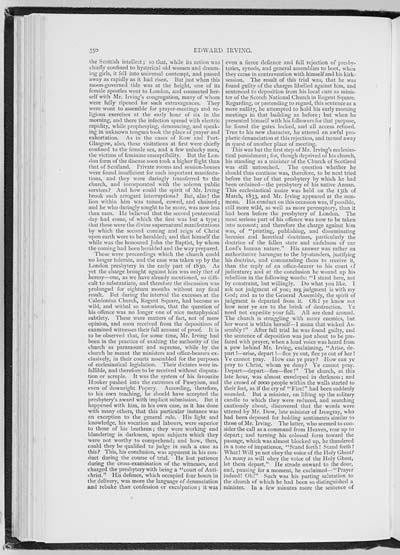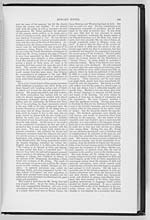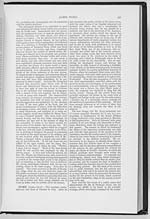350
the Scottish intellect; so that, while its action was
chiefly confined to hysterical old women and dream-
ing girls, it fell into universal contempt, and passed
away as rapidly as it had risen. But just when this
moon-governed tide was at the height, one of its
female apostles went to London, and connected her-
self with Mr. Irving's congregation, many of whom
were fully ripened for such extravagances. They
were wont to assemble for prayer meetings and re-
ligious exercises at the early hour of six in the
morning, and there the infection spread with electric
rapidity, while prophesying, denouncing, and speak-
ing in unknown tongues took the place of prayer and
exhortation. As in the cases of Row and Port-
Glasgow, also, these visitations at first were chiefly
confined to the female sex, and a few unlucky men,
the victims of feminine susceptibility. But the Lon-
don form of the disease soon took a higher flight than
that of Scotland. Private rooms and session-houses
were found insufficient for such important manifesta-
tions, and they were daringly transferred to the
church, and incorporated with the solemn public
services? And how could the spirit of Mr. Irving
brook such arrogant interruptions? But, alas! the
lion within him was tamed, cowed, and chained;
and he who daringly sought to be more, was now less
than man. He believed that the second pentecostal
day had come, of which the first was but a type;
that these were the divine supernatural manifestations
by which the second coming and reign of Christ
upon earth were to be heralded; and that himself the
while was the honoured John the Baptist, by whom
the coming had been heralded and the way prepared.
These were proceedings which the church could
no longer tolerate, and the case was taken up by the
London presbytery in the early part of 1830. As
yet the charge brought against him was only that of
heresy�one, as we have already mentioned, so diffi-
cult to substantiate, and therefore the discussion was
prolonged for eighteen months without any final
result. But during the interval the excesses at the
Caledonian Church, Regent Square, had become so
wild, and withal so notorious, that the question of
his offence was no longer one of nice metaphysical
subtlety. These were matters of fact, not of mere
opinion, and soon received from the depositions of
examined witnesses their full amount of proof. It is
to be observed that, for some time, Mr. Irving had
been in the practice of exalting the authority of the
church as paramount and supreme, while by the
church he meant the ministers and office-bearers ex-
clusively, in their courts assembled for the purposes
of ecclesiastical legislation. Their dictates were in-
fallible, and therefore to be received without disputa-
tion or scruple. It was the system of his favourite
Hooker pushed into the extremes of Puseyism, and
even of downright Popery. According, therefore,
to his own teaching, he should have accepted the
presbytery's award with implicit submission. But it
happened with him, in his own case, as it has done
with many others, that this particular instance was
an exception to the general rule. His light and
knowledge, his vocation and labours, were superior
to those of his brethren; they were working and
blundering in darkness, upon subjects which they
were not worthy to comprehend; and how, then,
could they be qualified to judge in such a case as
this? This, his conclusion, was apparent in his con-
duct during the course of trial. He lost patience
during the cross-examination of the witnesses, and
charged the presbytery with being a "court of Anti-
christ." His defence, which occupied four hours in
the delivery, was more the language of denunciation
and rebuke than confession or exculpation; it was
even a fierce defiance and full rejection of presby-
teries, synods, and general assemblies to boot, when
they came in contravention with himself and his kirk-
session. The result of this trial was, that he was
found guilty of the charges libelled against him, and
sentenced to deposition from his local cure as minis-
ter of the Scotch National Church in Regent Square.
Regarding, or pretending to regard, this sentence as a
mere nullity, he attempted to hold his early morning
meetings in that building as before; but when he
presented himself with his followers for that purpose,
he found the gates locked, and all access refused.
True to his new character, he uttered an awful pro-
phetic denunciation at this rejection, and turned away
in quest of another place of meeting.
This was but the first step of Mr. Irving's ecclesias-
tical punishment; for, though deprived of his church,
his standing as a minister of the Church of Scotland
was still untouched. The question whether he
should thus continue was, therefore, to be next tried
before the bar of that presbytery by which he had
been ordained�the presbytery of his native Annan.
This ecclesiastical assize was held on the 13th of
March, 1833, and Mr. Irving appeared at the sum-
mons. His conduct on this occasion was, if possible,
still more wild, as well as more peremptory, than it
had been before the presbytery of London. The
most serious part of his offence was now to be taken
into account; and therefore the charge against him
was, of "printing, publishing, and disseminating
heresies and heretical doctrines, particularly the
doctrine of the fallen state and sinfulness of our
Lord's human nature." His answer was rather an
authoritative harangue to the by-standers, justifying
his doctrine, and commanding them to receive it,
than the reply of an office-bearer to his court of
judicature; and at the conclusion he wound up his
rebellion in the following words: "I stand here, not
by constraint, but willingly. Do what you like. I
ask not judgment of you; my judgment is with my
God; and as to the General Assembly, the spirit of
judgment is departed from it. Oh! ye know not
how near ye are to the brink of destruction. Ye
need not expedite your fall. All are dead around.
The church is struggling with many enemies, but
her worst is within herself�I mean that wicked As-
sembly !" After full trial he was found guilty, and
the sentence of deposition was just about to be pre-
faced with prayer, when a loud voice was heard from
a pew behind Mr. Irving, exclaiming, "Arise, de-
part !�arise, depart!�flee ye out, flee ye out of her!
Ye cannot pray. How can ye pray? How can ye
pray to Christ, whom ye deny? Ye cannot pray.
Depart�depart�flee�flee!" The church, at this
late hour, was almost enveloped in darkness; and
the crowd of 2000 people within the walls started to
their feet, as if the cry of "Fire!" had been suddenly
sounded. But a minister, on lifting up the solitary
candle to which they were reduced, and searching
cautiously about, discovered that the words were
uttered by Mr. Dow, late minister of Irongray, who
had been deposed for holding sentiments similar to
those of Mr. Irving. The latter, who seemed to con-
sider the call as a command from Heaven, rose up to
depart; and turning his colossal form toward the
passage, which was almost blocked up, he thundered
in a tone of impatience, "Stand forth! Stand forth!
What! Will ye not obey the voice of the Holy Ghost?
As many as will obey the voice of the Holy Ghost,
let them depart." He strode onward to the door,
and, pausing for a moment, he exclaimed�"Prayer
indeed! Oh!" Such was his parting salutation to
the church of which he had been so distinguished a
minister. In a few minutes more the sentence of

![]() Universal Viewer |
Universal Viewer | ![]() Mirador |
Large image | Transcription
Mirador |
Large image | Transcription
![]()

